On 8 March, the world observes International Women’s Day.
The day is a celebration of the social, economic, cultural and political achievements of women. International Women’s Day serves as a focal point for women’s rights movements, and as a call to action for accelerating gender equality. Women in all walks of life continue to face unique challenges in contemporary society, and today is a chance to take action against inequality, raise awareness against bias and to actively challenge injustice and displays of prejudice.
In honour of International Women’s Day, we want to shine a light on the achievements of some of the glorious ladies who have graced the Eurovision stage over the years.
International Women’s Day: 12 inspirational ladies from Eurovision and beyond
Lys Assia
We kick off our list of inspirational Eurovision ladies with the woman who started it all. The forever iconic Lys Assia won the inaugural Eurovision Song Contest for Switzerland in 1956 with her elegant French-language chanson “Refrain”. Since her victory, Lys has remained a big figure in the Eurovision community. She even entered the Swiss national selection show for Eurovision 2013 alongside hip-hop group New Jack and their song “All In Your Head”.
Lys Assia sadly passed away in 2018 aged 94. But her spirit and legacy will live on forever!
Milly Scott
In 1966, Milly Scott made history as the first black singer — man or woman — to grace the Eurovision stage. A Dutch singer of Surinamese origin, Milly paved the way for more artists of colour to appear at Eurovision. She represented The Netherlands at Eurovision with her rumba song “Fernando & Filippo”. The rumba style has roots in Africa and found its way to other parts of the world during the slave trade. And though “Fernando & Filippo” only placed 15th in a field of 18, Milly’s song served as a harbinger of the more international sounds that Eurovision would welcome in the years to come.
Dana International
Viva la diva! In 1998, Dana International became the first transgender woman to take home the Eurovision trophy. Though some religious and conservative groups opposed her participation, she travelled to Birmingham and delivered a show-stopping performance of “Diva”, earning the maximum twelve points from three countries. She beat out the United Kingdom’s Imaani to the crown by a slim margin of just six points.
Dana International later returned to the contest in 2011. In Düsseldorf, she sang “Ding Dong” for Israel. Though she failed to qualify for the final, our queen continues to slay. “I want to send my critics a message of forgiveness and say to them: try to accept me and the kind of life I lead”, she says. “I represent a liberal Israel, an Israel which accepts the human being no matter how you are, no matter how you look and no matter what sex or race you are”.
France Gall
In 1965, France – real name Isabelle Gall — gave Luxembourg their second Eurovision win. Her French-language track “Poupée de cire, poupée de son” was the first uptempo Eurovision winner. Before Gall came along, every other Eurovision winning song was a classy violin-laden ballad or chanson. She marked the dawn of a new era. Since Gall’s appearance, we’ve been served high energy bops year after year.
Ms. Gall was also a regular patron of the charity Coeur de Femmes, investing in the research of cardiovascular disease and the specific intricacies involved with female heart surgery.
Unfortunately, Gall passed away in 2018 aged 70 following a two-year battle with cancer. Towards the end of her life, she lived a very private life. But her legacy continues – “Poupée de cire, poupée de son” is still a favourite with many Eurovision fans, reaching number 66 in this years ESC250, 55 years after her victory.
Destiny Chukunyere
The shining star of Malta. In 2015, Destiny won the Junior Eurovision Song Contest with her soul-pop song “Not My Soul”. At age 13, she became the first black woman to win any Eurovision singing event — and the first black artist irrespective of gender to triumph in the junior edition.
Following her junior Eurovision victory, Destiny appeared on the 11th series of Britain’s Got Talent, where she reached the semi-finals. In 2020, she won the second season of The X Factor Malta and earned the right to represent her home country at Eurovision in Rotterdam. Her song “All of My Love” was a favourite with fans. Shortly after the contest’s cancellation, Malta’s PBS confirmed that Destiny would return to sing for Malta at Eurovision 2021 with a new song. Could 2021 be her year?
Marija Šerifović
Marija comes from an Orthodox and Romani background. She gave Serbia their first Eurovision win in 2007. And what’s more is that she did it on their debut (prior to 2007 Serbia participated in union with Yugoslavia and later Montenegro). At the time of her victory, Marija was not publicly out as lesbian — she came out in 2013. However, the sapphic undertones in her performance of “Molitva” gave some well-needed visibility to the LGBTQ+ women of the Eurovision community.
Bojana Stamenov
Singing for Serbia, Bojana Stamenov scored 10th place at Eurovision 2015 with her empowering track “Beauty Never Lies”. Opening with a dramatic ode to Phantom of the Opera, the track later becomes an epic dance number that got everybody around Europe up and dancing. The song’s lyrics celebrate the diversity of beauty. “Finally I can say, I am different and it’s okay” — Bojana reminds us that we are all beautiful, no matter our shape, size, race, sexuality or gender.
Krista Siegfrieds
Finnish superstar Krista Siegfrids turned the heteronormative nature of pop music on its head in 2013 when she performed her iconic track “Marry Me” in Malmö. She was joined on stage by two female backing vocalists and three female dancers in masculine drag tuxedo looks, which later revealed into elegant bridesmaid gowns. The grand finale of her performance showed a close up shot of Krista kissing one of her backing vocalists — the first lesbian kiss at Eurovision.
Krista included the kiss to show her support of same-sex marriage in Finland. “I don’t think ‘Marry Me’ is political”, Krista told The Independent. “It’s about love and tolerance. But gay marriage is not allowed in Finland and that’s wrong. I wanted to make a statement about that”. One year after Krista’s Eurovision appearance, the Finnish parliament approved same-sex marriage. The law took effect three years later, with Finland hosting its first same-sex marriage ceremony in 2017.
Valeria Gribusova (VAL)
Lera — one half of the duo VAL — was set to represent Belarus at Eurovision 2020 prior to the contest’s cancellation. VAL’s song “Da Vidna” is a striking feminist anthem about a woman in an unhappy forced marriage. In the first verse, the woman is heard questioning her life, asking why she ended up with her current husband, whom she didn’t choose herself. The chorus offers a note of empowerment, as the woman realises that she is not alone with her problems.
Valeria has remained vocal about issues surrounding women’s body image. She consciously decided to fight industry pressures and refused to sustain certain images of Eastern European women portrayed in the media. She stopped caring about the need to be thin, and started rocking her curves and wearing hoodies.
As a duo, VAL continue to stand by their values. The pair have also expressed their support for the pro-democracy protests in Belarus. When Belarusian broadcaster announced the duo would not return to represent Belarus in 2021, VAL said: “for us, such concepts as honor, decency, freedom, respect, love and, most importantly, people’s lives are much more important than personal preferences from any current state organisation.”
Nikkie de Jager (NikkieTutorials)
She’s an international beauty sensation. With more than 13 million subscribers on YouTube and 14 million followers on Instagram, Nikkie de Jager is one of the most successful beauty gurus in the game. She’s done makeup for superstars like Jessie J, Kim Kardashian and Lady Gaga. And in 2020, Nikkie launched her own eye shadow pallet in collaboration with Beauty Bay.
Prior to the contest’s cancellation, Nikkie was set to be the online host of Eurovision 2021. But in 2021, she was given a promotion. Nikkie will take to the Rotterdam Ahoy stage as one of the four main hosts, making her the first transgender woman to host the Eurovision Song Contest.
Netta Barzilai
In 2018, her song “Toy” topped the Eurovision scoreboard and brought Israel their fourth song contest victory. While on surface level, Netta’s performance treads the line of zany novelty entries, there is something more meaningful behind the lyrics. As Netta sings “wonder woman don’t you ever forget”, she stands up for female empowerment, reminding women around the world that they are strong, powerful, and should refuse to be defined by the patriarchy. Netta has since gone on to release a string of hit singles, including “Nana Banana” and “Cuckoo”.
Monika Kuszyńska
In 2006, Monika and her band Varius Manx were involved a serious car accident which resulted in the singer becoming partially paralysed from the waist down and using a wheelchair. But she didn’t let that stop her career. In 2015, Monika represented Poland at Eurovision in Austria with her song “In the Name of Love”. She made Eurovision history by being the first person to sing on stage at Eurovision in a wheelchair — showcasing her strength and giving visibility and representation to the disabled community.
International Women’s Day
Here at wiwibloggs, we celebrate all women. That includes cisgender women, transgender women, women of colour, and non-binary and intersex people who identify with the term. Yesterday, today and tomorrow, we will continue to support women from all walks of life and amplify their voices as we take steps towards achieving a society free from sexism, transphobia, racism and prejudice of any kind.
Happy International Women’s Day to all of our readers!
Who are your Eurovision heroes? What other inspirational women have taken to the Eurovision stage? Let us know in the comments below.
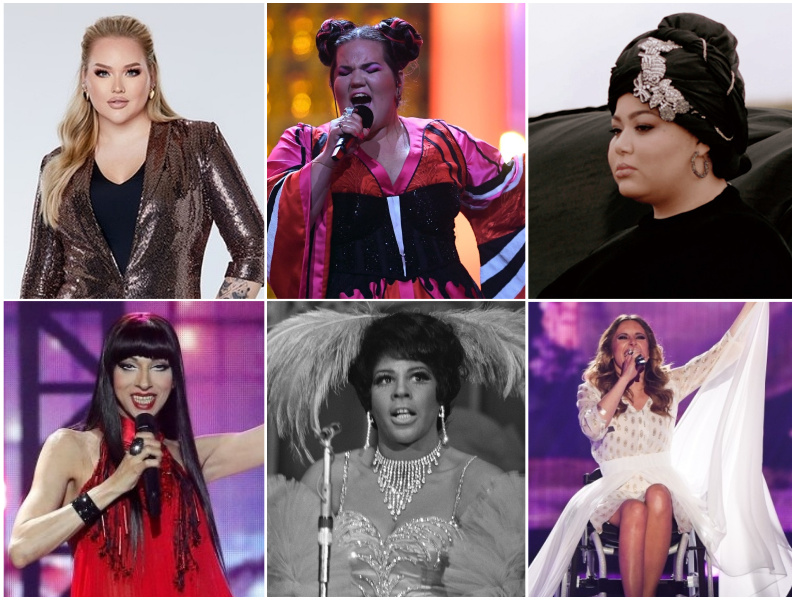

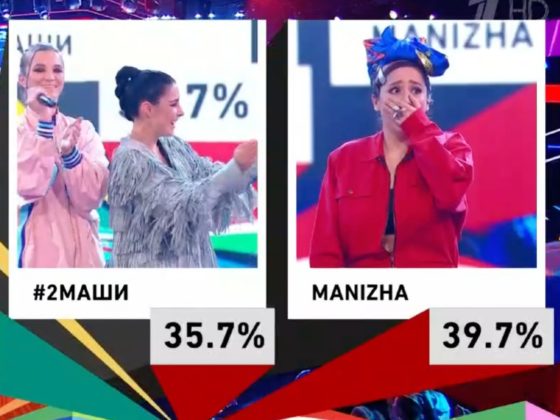
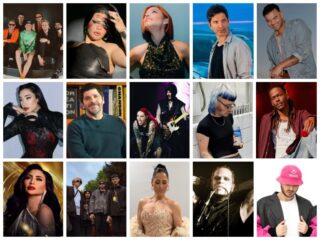


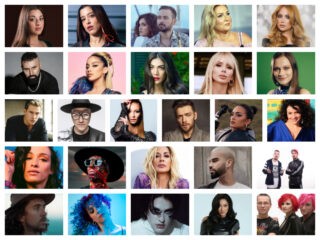
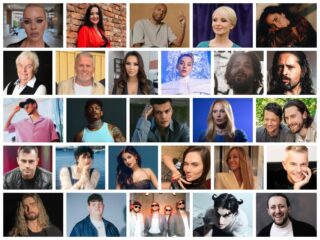
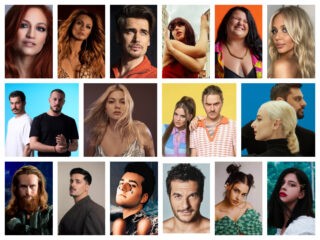
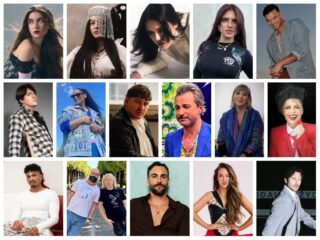

As a fan with a physical disability and who uses a wheelchair myself, it was great to see Monika performing in her wheelchair.
What about Celine Dion? Is she the only Canadian singer to win the Contest?
Can I add Åse Kleveland? If I remember right she was the first woman to not wear a dress on Eurovision stage, but a pantsuit instead
Monika Kuszynska respect for you
I love
Netta, the “you stupid boy” singer?
Way to support misandry, wiwibloggs, and then pretend it’s women empowerment.
I know. Imagine if a song had the lyric “you stupid girl”.
In a male-dominated music industry, “Toy” echoes the words of the #MeToo movement and encourages women to stand up against men who believe women to be their playthings. I’m certain “stupid” is one of the kinder words Netta could have used to describe these men.
I’m sorry but it has as much to do with #metoo movement as Trump has with subtlety. 😛
Why. Do you feel like you’re being addressed?
And imagine… like, male singers singing about hoes and b*tches… or women who did them wrong… that like, never happens… they really should… to balance things out, you know.
Yvonne Littlewood, for being the first female director – back in 1963.
Monica Dominique, Nurit Hirsh and Anita Kerr for being the only female conductors.
And Nurit for being the only female winning conductor
natalia gordienko, senhit, and eleni should be in this list <3
Because…?
because they are iconic
Luisa Sobral and Jamala for being the only times that the winning songwriters were women only.
Love you for pointing that out. <3
Love you for this Wiwibloggs! Happy IWD to everyone!
I would add Corrina May and Julia Samoylova to this mix.
In Eastern Europe this is huge, it seems to me that Western Europe doesn’t pay so much attention to Women’s Day.
Last year the Women’s March in Spain was huge. Sadly it was held at the eve of the outbreak.
Awesome article! I would also add the lovely Tamara Todevska to this list, as “Proud” was made to empower women.
I was just about to add the same comment! I’d also add Sanja Vucic 2016, with her ode of empowerment to the victims of domestic abuse.
Yes, her too! Love that song.
all of them are amazing
Indeed, but this list would’ve been even better with Valentina Monetta in it.
Imagine not mentioning Valentina Monetta smh.
Thank you, Oliver Adams, for this beautiful selection of amazing WOMEN of all shapes, cultural backgrounds, gender identities, sexual orientations and ethnicities. This plurality is more necessary now than ever, and everyone (in and outside of this bubble) should continue to celebrate and praise. Every day! <3
Glad you enjoyed the article Alaska!